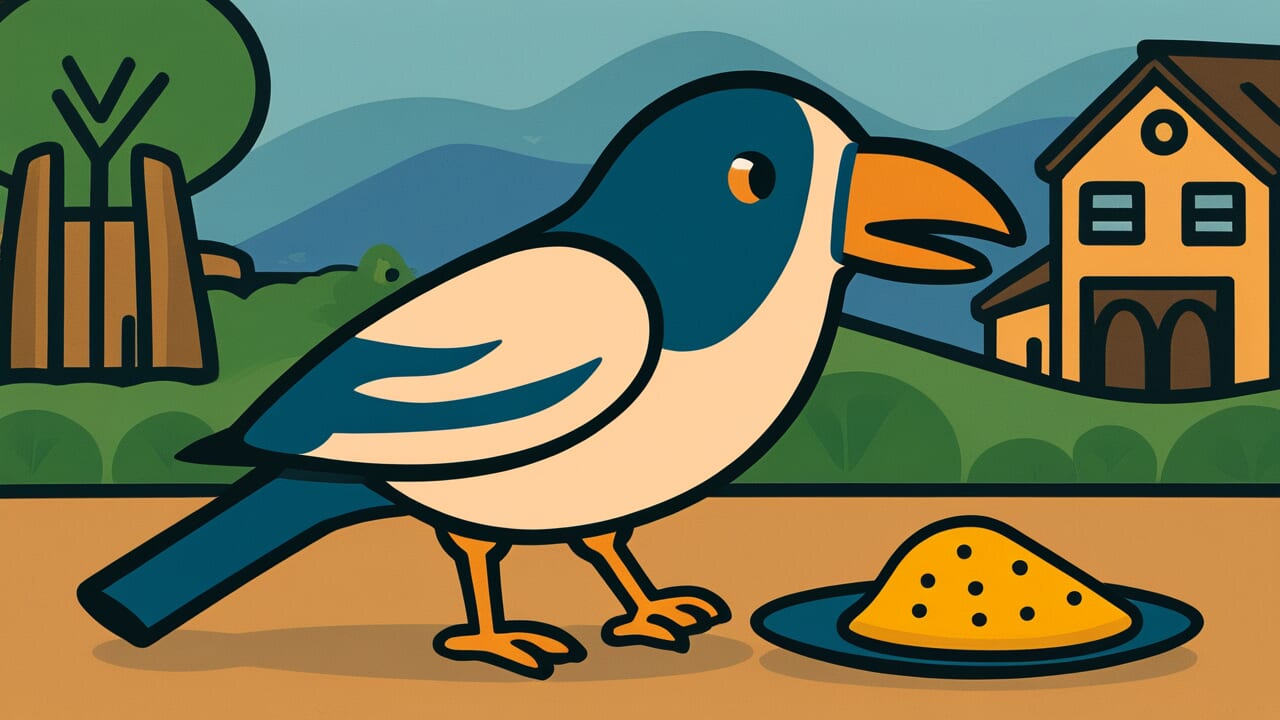How to Read “Eat birds, but don’t eat greed”
Tori wa kutomo, dori kūna
Meaning of “Eat birds, but don’t eat greed”
This proverb means you can eat foods containing the character for bird on regular days, but you should not eat them on days of the Rooster in the zodiac calendar.
The word “tori” (bird) refers to poultry meat like chicken or duck. The word “dori” refers to days of the Rooster in the twelve zodiac signs.
In other words, eating bird meat is fine normally, but you should avoid it on Rooster days in the calendar.
People used this expression to communicate dietary taboos in daily life. They especially used it to remind family and others when Rooster days approached.
Modern people rarely follow calendar-based food restrictions anymore. However, this proverb remains valuable because it shows how Edo period people closely connected the calendar with daily life.
The expression sounds like wordplay, but it contains the lifestyle customs and religious beliefs of that era.
Origin and Etymology
No clear written records explain the origin of this proverb. However, the structure of the words reveals an interesting background.
The key point is the two ways of writing “tori” and “dori.” Both have the same sound, but the first uses kanji while the second uses hiragana.
This distinction is the heart of the proverb.
In the Edo period calendar, the twelve zodiac signs were assigned to dates. Rooster days came around every twelve days.
Since the Rooster represents birds in the zodiac, “dori” is thought to refer to Rooster days.
People in those times had many customs of avoiding certain actions on specific days. These practices came from onmyōdō (yin-yang philosophy) and folk beliefs.
They were deeply rooted in daily life. Avoiding bird meat on Rooster days was likely one such taboo.
This proverb sounds like wordplay, combining memorability with practicality. The rhyme-like expression made it easy to remember and spread by word of mouth.
It captures the living wisdom of Edo commoners who connected the calendar with food taboos.
Usage Examples
- Today is a Rooster day, so following “Eat birds, but don’t eat greed,” let’s have yakitori tomorrow instead
- My grandmother often said “Eat birds, but don’t eat greed” and made fish dishes on Rooster days
Universal Wisdom
Behind this proverb lies the universal human wisdom of “creating boundaries.”
Humans have always drawn lines between ordinary and special days to give life rhythm and meaning.
If every day were exactly the same, time would feel monotonous and life would become bland.
That’s why people established special days with special rules. These boundaries gave time structure and color.
“Eat birds, but don’t eat greed” may seem unreasonable at first. But this small restriction served as a device to make people aware of the calendar.
It made them sensitive to the flow of time.
By avoiding bird meat on Rooster days every twelve days, people naturally became conscious of dates. They felt the changing seasons and the passage of time.
This teaching also embodies the human virtue of “moderation.” Rather than eating whatever you want whenever you want, you sometimes intentionally hold back.
This makes the next meal more enjoyable.
Restrictions make daily life richer. This is timeless human wisdom.
Through such small taboos, our ancestors tried to teach the importance of self-control. They showed how to live in harmony with the calendar.
When AI Hears This
This proverb highlights a remarkable feature of human language processing systems. When heard as speech, “tori wa kutomo, tori kūna” sounds completely identical.
In other words, ears alone cannot distinguish “tori” (bird) from “dori” (Rooster day).
But the moment it’s written, visual information through kanji and kana splits the meaning.
Cognitive linguistics research shows that human brains perform “predictive processing” when handling speech. They guess meaning from context and surrounding information.
What makes this proverb interesting is its structure that intentionally betrays that prediction.
The first half says “eat birds,” making you imagine poultry. Then the second half uses the same sound to say “don’t eat dori.”
This two-stage trick is wordplay that exploits the ambiguity of spoken language.
Even more fascinating is that this proverb can only be fully understood when written. With sound alone, you might sense “this is some kind of wordplay.”
But only when you see the characters does it click: “Ah, I see!”
This proves that human language has gained expressive richness beyond mere information transfer by having two modes: speech and writing.
The Japanese language’s characteristic of assigning multiple meanings to identical sounds makes this proverb possible.
Lessons for Today
This proverb teaches modern people the truth that “richness exists within constraints.”
Modern society seems to offer infinite choices. You can eat whatever you want, whenever you want. You can do whatever you like, anytime.
But doesn’t this very freedom sometimes exhaust us?
Because everything is possible, we struggle to choose. After choosing, we regret: “Maybe the other option was better.” Everyone has experienced this.
Setting deliberate constraints actually leads to mental freedom. If you have a simple rule like “I don’t eat bird meat on Rooster days,” you don’t need to hesitate.
You can just enjoy fish dishes instead.
Constraints reduce the burden of decision-making. They create the joy of being creative within given options.
Why not create your own small rules? “I make time without my smartphone on Mondays.” “I try something new on the first of every month.”
Anything works.
That small constraint will bring new rhythm and discoveries to your daily life. Freedom may not be about having everything.
It may be about living richly within constraints you’ve chosen for yourself.



Comments